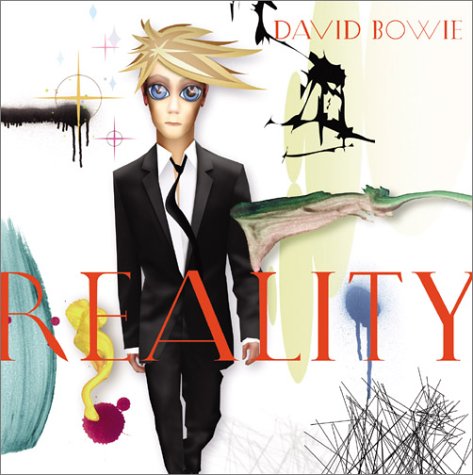
ISO Records
Total Running Time - 49:17
Personnel
David Bowie - Vocals, guitar, keyboards, stylophone, baritone sax, percussion, synths, backing vocals; Earl Slick - Guitar; Mike Garson - Piano; David Torn - Guitar; Gail Ann Dorsey - Backing vocals; Sterling Campbell - Drums; Matt Chamberlain - Drums; Catherine Russell - Backing vocals; Tony Visconti - Bass, guitar, keyboards, backing vocals; Gerry Leonard - Guitar; Mark Plati – Bass, guitar; Mario J. McNulty - Percussion
1. New Killer Star
2. Pablo Picasso
3. Never Get Old
4. The Loneliest Guy
5. Looking for Water
6. She’ll Drive the Big Car
7. Days
8. Fall Dog Bombs the Moon
9. Try Some, Buy Some
10. Reality
11. Bring Me the Disco King
It seems to be de rigeur for most critics to dismiss the large majority of David Bowie’s output from the mid- to late-eighties onward. Up to a point, at least. Starting with 2002’s Heathen, and continuing with his latest, Reality, the lingering memories of past critical transgressions seem to finally be dissipating.
I, for one, don’t agree with the conventional wisdom on Bowie, as there was much to like on 1997’s Earthling, which was considered by some to be mere dabbling in electronica. And the vote wasn’t unanimous on Heathen, either. But the reception of these albums, and even the whole idea of something like Tin Machine, the ill-fated attempt by the former Thin White Duke to completely reinvent himself in a hard rock band on the cusp of the grunge revolution, paints an interesting picture of the critical landscape.
What I’m saying is, I think I understand why Reality has gone over well. For quite some time, David Bowie seems to have been most interested in finding novel contexts in which to try to be -- or in the case of Tin Machine, try not to be -- David Bowie. This is going to be, almost by definition, a tough pill to swallow for anyone who is more beholden to what Bowie’s first ten or fifteen years as an artist staked out as his “sound.” There are stories of producer Brian Eno concocting bizarre plots with musicians as characters and the songwriting and recording strategies getting more and more oblique, and both fans and critics seemed unwilling to follow along for the entire ride.
By and large, this process ended when the singer was reunited with Tony Visconti, the “other” producer (along with Eno) responsible for Bowie’s “Berlin Trilogy” of Heroes, Lodger and Scary Monsters in the late seventies. The immediate result was Heathen, which, after being air-dropped into so many different sounds, felt like a return to familiar terrain.
At first blush, Reality seemed like more of the same, not necessarily a bad thing in it’s own right. What was interesting was seeing critics who panned Heathen come around on the new record. Then it hit me. Heathen is Bowie sounding like Bowie again. But Reality, with the singer’s experience in post-9/11 New York City informing a lot of the material, was Bowie really being Bowie again. I have a blind spot for lyrical content, and when you look back over the latter half of the catalog, there are certainly good songs, but perhaps not a lot of songs that really mean something. Of course, there are exceptions, but I think this theory holds up. If you have a vague notion of piano and acoustic guitar textures in somewhat spacey rock songs, Heathen brought that back. If you expect David Bowie’s songs to mean something, then Reality is the true return to form.
in this section:
search
recent entries in REVIEWS
August 14, 2008
Lollapalooza 2008 Day 2 (8/2/2008)
August 14, 2008
Lollapalooza 2008 Day 1 (8/1/2008)
August 14, 2008
Lollapalooza Day 3 (8/5/2007)
August 14, 2007
Lollapalooza Day 2 (8/4/2007)
August 7, 2007
archives by month
3 posts
August 2007
3 posts
September 2005
1 posts
August 2005
1 posts
February 2005
1 posts
February 2004
2 posts
COMPLETE MONTHLY ARCHIVES